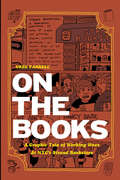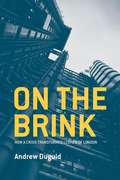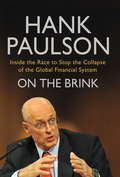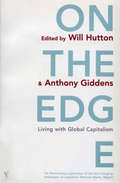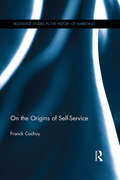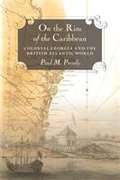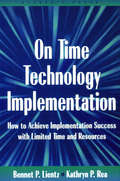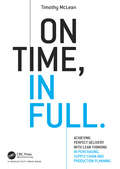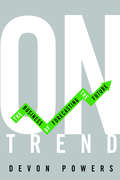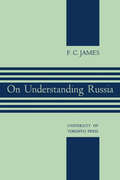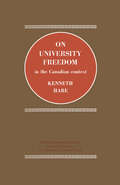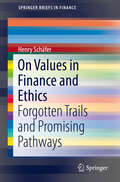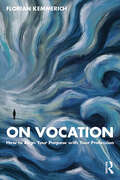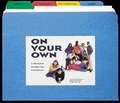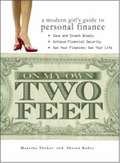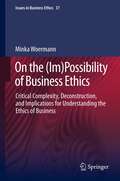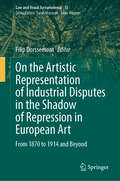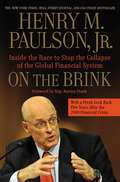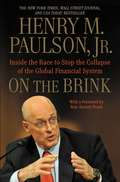- Table View
- List View
On The Books: A Graphic Tale of Working Woes at NYC's Strand Bookstore (Comix Journalism Ser.)
by Greg FarrellA David and Goliath story, On The Books is the first-hand comic strip account of the labor struggle at NYC's legendary Strand bookstore in the summer of 2012. Told by Greg Farrell-an employee of the store who interviewed numerous other members of the staff-the book examines the motives and actions of those involved, including the store, the staff, the union local, and the people of New York City. Through interstitial comic portraits Farrell gives voice to his comrades, who often share a nuance of the story that would have otherwise gone overlooked and provide a depth of opinion and fairness to accompany Farrell's often very personal interpretation of events. In ten short chapters the book explores at once the inner workings of our national retail environment, the struggle to exist within it as a young working person, the current state of the book trade, and the impact of the economic recession on all of these factors.
On The Brink
by Andrew DuguidThis is the story of how huge losses very nearly destroyed a revered British institution, Lloyd's of London, the world's largest insurance market; how outraged members challenged a complacent institution; and how it changed to confront and overcome its biggest ever crisis. Ten thousand people faced huge personal bills they thought profoundly unfair. They were trapped; there was no escape. The market that insured disasters had become a disaster for its members. The story of Lloyd's is relevant now, raising many contemporary issues: levels of professional competence, trust, negligence, perverse incentives, and responsibilities owed by insiders to outside investors. High rewards contrast sharply with disastrous results. It raises the legitimacy of governing institutions, the right degree and form of self-regulation and the role of government. It illuminates the limits of tolerance, the power of anger, and its limitations. The search for justice shines a light on the workings of the English and US legal systems. Fairness is pitted against commercial expediency. Old attitudes clash with new circumstances. Leadership is critical in building trust and deciding when to compromise. Fresh thinking, new structures and new skills are all needed to find a way to balance the interests of past and future stakeholders. Persuasion has to overcome alternative analysis, misunderstanding, anger and inertia. Engagement of opposing parties proves critical. The issues illustrated by this story arise each day in Britain, the US and elsewhere. On the Brink is a true story of strong characters, changing fortunes, contrasting values, incompetence, real experts, self-help, creative compromise, innovation and change. It is the story of individuals, groups, leaders and the institution, locked in a battle for survival, each slow to see their common interest. To this day, the Lloyd's crisis raises strong emotions among those involved; many myths have grown up. This book tells what really happened, from the inside. A website, www. onthebrink. uk. com, accompanies this book with extra detail for those interested.
On The Brink
by Hank PaulsonFast-paced and dramatic re-telling of the financial crisis that nearly bought the developed world to its knees. Hank Paulson was at the absolute epicentre of the recent economic storm, and his account of how he dealt with the greatest financial crisis since the Great Depression makes for absolutely fascinating reading. The book contains all the decisive moments in the economic crisis, including the pivotal meetings with mortgage giants Fannie Mae and Freddie Mac, as well as Paulson's personal recollections of and conversations with President Bush, President Obama, Federal Reserve Chairman Ben Bernanke and current Treasury Secretary Timothy Geithner. As well as detailing the major decisions taken during the crisis, Paulson also puts forth the policies he believes need to be implemented to take us securely into the future.
On The Edge
by Anthony GiddensCapitalism has become the universal social and economic order of our time. The capitalism of today, however, differs from that of previous eras; with intensifying globalisation, flexible organisations, and new forms of class divisions. Globalisation brings new possibilities, but also new risks, ranging from degradation of the environment to the concentrated control of the media. On the Edge comprises original essays by, among others, Polly Toynbee, Richard Senett and George Soros. They chart the contours of contemporary capitalism, analyse the role of the business firm, and consider whether the new capitalism is compatible with social cohesion and social justice. They discuss capitalism both as a form of culture and as an influence on daily life, and ask if capitalism has any viable rivals at the turn of the millennium.
On The Origins of Self-Service (Routledge Studies in the History of Marketing)
by Franck CochoyMost marketing scholars implicitly consider independent merchants as conservative and passive actors, and study the modernization of retailing via department stores, chains and supermarkets. In this innovative study, Franck Cochoy challenges this perspective and takes a close look at the transformation of commerce through the lens of Progressive Grocer, an American trade magazine launched in 1922. Aimed at modernizing small independent grocery stores, Progressive Grocer sowed the seeds for modern self-service which spread in small retail outlets, sometimes well before the advent of the large retail spaces which are traditionally viewed as the origin of the self-service economy. The author illustrates how this publication had a highly influential role on what the trade considered to be best practice and shaped what was considered to be cutting edge. By displacing the consumer and their agency from the centre of analytic attention, this innovative book highlights the complex impact of social, technical and retailing environment factors that structure and delimit consumer freedom in the marketplace. This detailed critical analysis of the origins of self-service will be of interest to a wide variety of scholars not only in marketing and consumer research, but also in business history, sociology and cultural studies.
On The Rim Of The Caribbean: Colonial Georgia And The British Atlantic World
by Paul M. PresslyHow did colonial Georgia, an economic backwater in its early days, make its way into the burgeoning Caribbean and Atlantic economies where trade spilled over national boundaries, merchants operated in multiple markets, and the transport of enslaved Africans bound together four continents? In On the Rim of the Caribbean, Paul M. Pressly interprets Georgia's place in the Atlantic world in light of recent work in transnational and economic history. He considers how a tiny elite of newly arrived merchants, adapting to local culture but loyal to a larger vision of the British empire, led the colony into overseas trade. From this perspective, Pressly examines the ways in which Georgia came to share many of the characteristics of the sugar islands, how Savannah developed as a "Caribbean" town, the dynamics of an emerging slave market, and the role of merchant-planters as leaders in forging a highly adaptive economic culture open to innovation. The colony's rapid growth holds a larger story: how a frontier where Carolinians played so large a role earned its own distinctive character. Georgia's slowness in responding to the revolutionary movement, Pressly maintains, had a larger context. During the colonial era, the lowcountry remained oriented to the West Indies and Atlantic and failed to develop close ties to the North American mainland as had South Carolina. He suggests that the American Revolution initiated the process of bringing the lowcountry into the orbit of the mainland, a process that would extend well beyond the Revolution.
On Time Technology Implementation
by Bennet Lientz Kathryn ReaOn Time Technology Implementation presents technology implementation guidelines and lessons learned from over 30 years of successful, hands-on project experience.
On Time and On Budget/ Project Management Collection
by Joe KnightThe Harvard Business Review Project Management Collection is for anyone serious about project management. Project Management for Profit shows every company owner and project manager—at businesses large and small—how to run projects differently. Reinventing Project Management, based on an unprecedented study of more than 600 projects in a variety of businesses and organizations around the globe, provides a new and highly adaptive model for planning and managing projects to achieve superior business results.
On Time, In Full: Achieving Perfect Delivery with Lean Thinking in Purchasing, Supply Chain, and Production Planning
by Timothy McLean"On Time-In Full" is an important work. Tim McLean provides an easy to follow practical approach to building a highly performing supply chain" -Drew Locher, Shingo Prize Winning Author and Lean Thinker The most fundamental requirement for a manufacturing or distribution business is to deliver to customers what they want, in the quantity they want, when they want it. It doesn’t matter how good your product is, how much the customer likes your salesperson, how slick your marketing campaign is: If your customers can’t get what they want when they want it, they will get it elsewhere, and your business will be in serious trouble. On Time in Full: Achieving Perfect Delivery with Lean Thinking in Purchasing, Supply Chain and Production Planning is a step-by-step practical guide to designing a Lean Supply Chain that will deliver what your customers need, when they need it, every time. Timothy McLean shares his three decades of Lean supply chain experience -- In simple straightforward language, he explores the reasons why supply chains fail to deliver and what you can do about it. On Time In Full includes practical guidance for tackling the big issues affecting supply chains including: How to understand your extended supply chain with a value stream map The role of forecasting in your supply chain and how to get a meaningful forecast Calculating the right level of inventory for your business Scheduling daily production to meet demand Managing suppliers and your supply chain at home and internationally Selecting and making the best use out of an ERP system Designing an efficient distribution network The book is full of practical case studies and examples as well as references for further study. On Time, In Full is the complete guide to setting up a supply chain that works.
On Trend: The Business of Forecasting the Future
by Devon PowersTrends have become a commodity—an element of culture in their own right and the very currency of our cultural life. Consumer culture relies on a new class of professionals who explain trends, predict trends, and in profound ways even manufacture trends. On Trend delves into one of the most powerful forces in global consumer culture. From forecasting to cool hunting to design thinking, the work done by trend professionals influences how we live, work, play, shop, and learn. Devon Powers' provocative insights open up how the business of the future kindles exciting opportunity even as its practices raise questions about an economy increasingly built on nonstop disruption and innovation. Merging industry history with vivid portraits of today's trend visionaries, Powers reveals how trends took over, what it means for cultural change, and the price all of us pay to see—and live—the future.
On Two Wheels in Paris: The Velib' Bicycle-Sharing Program
by Elena Corsi Vincent Dessain Peter A. ColesFrench advertising company JCDecaux and the city of Paris jointly developed V lib', a wildly popular bicycle sharing system. Despite V lib's public appeal, vandalism and theft led to ballooning operating costs-costs borne by JCDecaux alone. The two parties opted to renegotiate their contract, which would impact prices, revenue sharing, cost allocation, and the operation of the system as a whole. Could the parties agree on a common strategy that would meet their objectives, while still delivering a first class bicycle sharing service to the city of Paris?
On Understanding Russia
by F. JamesAs an outstanding educator and economist, Dr. F. Cyril James is particularly well qualified to observe modern Russia, and to comment upon it for Western readers. While he disclaims any right to speak with authority on the basis of his recent tour, the reader will quickly realize that he was actually given exceptional opportunities to see Soviet life, economy, and education – visiting some places that few foreigners have seen – and that, as a trained observer, he was able to draw fully from his experiences. As Dr. James points out, "it is imperative that we should learn all that we can about the U.S.S.R. in order to understand its people – their habits, their ambitions, and their thoughts." He describes most vividly how the system of research institutions and university education provides incentive and then a very fully occupied life for those who are gathered into it. The comparisons of university budgets, salaries, and student expenses with those of North America are revealing. Dr. James tells also of the interesting developments from Mr. Khrushchev's proposal that students should work in factories or on farms before going on to university.
On University Freedom in the Canadian Context
by Kenneth HareThe universities of Canada are now expanding rapidly and becoming very costly to run and equip. Increasingly the bill is borne by the public exchequers, federal and provincial. What then should be the proper relationship between government and universities if university freedom is to be preserved? This book, based on the Plaunt Lectures given at Carleton University in 1967, discusses the various aspects of the question. The author for example, discusses the British solution of a buffer committee between government and university, and the American concept of a lay board of regents which has jurisdiction over the university system in the name of the people. He suggests that the best device is for the universities themselves to form a strong cooperative body and for the state to arm this body with statutory instruments. Most provinces now have a Provincial Advisory Committee and the author proposes that the staff needed to assess and scrutinize budgets for university funds equitably should be under the control of this committee rather than the provincial Ministers. As a collateral to the question of university freedom Dr. Hare also asks "whose freedom is it?" and in answering this he takes up the question of the unrest on campuses today among the students, and the trend toward more student participation in university administration. He supports the recent action taken by many Canadian universities of allowing student membership in their Senate. At a time when the problem of university freedom and control is one of the most controversial in the academic world, this study will be of interest to all members of that community, and to anyone in federal and provincial politics.
On Values in Finance and Ethics: Forgotten Trails and Promising Pathways (SpringerBriefs in Finance)
by Henry SchäferThis book uses the building blocks of modern capital market theory, including behavioural finance, as the point of departure for an analysis of hidden ethical content in the contemporary research into capital markets. It illustrates the significant degree of alienation between the financial and the real side of economies, stemming from the long-standing struggle between ethics and economics. Furthermore, it provides a roadmap of modern value thinking, highlighting the crucial role of stakeholders and non-governmental organizations.
On Vocation: How to Align Your Purpose with Your Profession
by Florian KemmerichOn Vocation: How to Align Your Purpose with Your Profession explores the transformative journey of aligning one’s passion and purpose with one's profession to create meaningful impact.Instead of a career guide, this book is more of a blueprint for aligning personal values with professional endeavours in a way that fosters resilience, innovation, and systemic impact. Many professionals feel disconnected from their work, grappling with dissatisfaction, burnout, and a lack of purpose. Traditional career advice often fails to address the deeper alignment between an individual's values and their professional contributions. This book fills that gap by providing a structured, actionable process to help readers transform their careers into vocations that bring both personal fulfilment and systemic impact. In this highly practical book, Florian Kemmerich introduces the concept of “vocating,” a structured seven-step process that helps readers discover their true calling, align it with global challenges, and build a sustainable vocation that contributes to both personal fulfilment and societal good. On Vocation offers readers actionable tools, reflective exercises, and inspiring narratives to help them navigate their own path toward a purpose-driven vocation.Readers learn not only how to discover their purpose but also how to implement it within their professional lives in a way that benefits both themselves and the world.
On Weldon's Watch: Recalls at Johnson & Johnson from 2009 to 2010
by Sandra J. Sucher Matthew Preble Clayton Rose Rachel GordonIn October of 2010, Johnson & Johnson (J&J) was unable to extricate itself from a year long recall crisis that had subjected the firm to criticism from Congress and regulators, resulted in the resignation of one of the firm's most senior officers, and cost hundreds of millions of dollars from lost sales of J&J brands. This case examines the series of recalls, and the strategic and cultural changes at the company that may have led to the recalls. It allows for an exploration of the reality of the iconic J&J "Credo" - its long standing set of corporate values.
On Your Own Instructional Booklet: A Personal Budgeting Simulation
by Mary Queen DonnellyThis simulation depicts a recent high school graduate finding out what it means to be On Your Own financially. The text presents the process of opening a checking account, renting an apartment, applying for credit, looking for a job, buying a car, and paying taxes. Students complete parallel activities for themselves as they work through the text, completing budgets and creating filing systems for personal financial information. As the graduate learns what it means to be on your own, so will your students.
On Your Own Two Feet: The Essential Guide to Financial Independence for all Women
by Helen BakerFemale financial independence is vital for women to live a secure and fulfilled life. Written by the most credentialled financial planner / author on the subject, this book is the essential guide for all women – from young girls starting out with their first job to older women retiring from the workforce or widowed.
On Your Own: A Personal Budgeting Simulation, 3e
by Mary Queen DonnellyThis activity-based simulation depicts a recent high school graduate finding out what it means to be on their own financially. The simulation allows students to experience the process of opening a checking account, renting an apartment, applying for credit, looking for a job, buying a car, shopping online, banking electronically, paying taxes, and more. Students complete parallel activities for themselves as they work through the simulation, completing budgets and creating filing systems for personal financial information.
On my Own Two Feet
by Manisha Thakor Sharon KedarWhether you've been living paycheck-to-paycheck, are trying to save for a down payment on your first home, or are hoping to one day retire in comfort, ON MY OWN TWO FEET can help. This succinct guide will teach you how to balance your desire to live well today with the need to save and invest for tomorrow. In this lively, no-nonsense financial primer you will learn: * How much of your income to save * How to avoid the perils of credit card debt * How to create a budget you can live with (and still have fun!) * How to invest wisely using a powerful, keep-it-simple plan * How to deal with real life situations - such as figuring out how much home or car you can afford & how to handle money when you couple up with that someone special
On the (Im)Possibility of Business Ethics: Critical Complexity, Deconstruction, and Implications for Understanding the Ethics of Business
by Minka WoermannCorporations, and the environments in which they operate, are complex, with changing multiple dimensions, and an inherent capacity to evolve qualitatively. A central premise of this study is that a postmodern reading of ethics represents an expression of, and an engagement with, the ethical complexities that define the business landscape. In particular, the deconstructive philosophy of Jacques Derrida offers a non-trivial reading of a complex notion of ethics, and thereby helps us to develop the skills necessary to critique and intervene in our practices, and to develop robust strategies for living in the absence of prescriptive ethical frameworks. Although a central premise of this study is that substantive ethical claims can only be generated within a given context, the study nevertheless presents readers with a meta-position that illustrates the type of considerations that should inform ethical reflection from a complexity perspective. In order to illustrate the value that this meta-position holds for business ethics, these considerations are explored in terms of the implications that they hold for our understanding of corporate social responsibility, for the practice of responsible management and leadership practices, and for teaching business ethics.
On the Artistic Representation of Industrial Disputes in the Shadow of Repression in European Art: From 1870 to 1914 and Beyond (Law and Visual Jurisprudence #15)
by Filip DorssemontThis book is the first volume on the artistic representation of industrial disputes in European art (from 1870 to 1914) since the catalogue of the landmark exhibition Streik, Realität und Mythos, organized by the Deutsches Historisches Museum (1992). It has been written by a group of scholars who share a keen interest in social history and the history of art, as well as in-depth knowledge of industrial relations and collective labour law. Seeking to transcend a purely western European perspective, the book offers unprecedented insights into artistic production in Poland and Hungary from the 19th century to the communist era. It even goes beyond the European continent, examining the United States and Mexico. The media explored include painting, sculpture, the graphic arts and photography. Further, the book deals with artists great (Carlo Carrà, Walter Crane, James Ensor, Juan Gris, Käthe Kollwitz, Constantin Meunier,Mihály Munkácsy, Théophile-Alexandre Steinlen and Jan Toorop) and small, sometimes even anonymous. The artistic styles range from (social) realism, naturalism and neo-impressionism to futurism and socialist realism. All stages of industrial disputes (from the causes of strikes to their violent suppression) are subjected to iconographical and iconological analysis, combined with perspectives from visual studies, critical art and gender studies. Agricultural workers, miners, construction workers and textile workers fill the scenes. Most of them are subordinate workers; others are (bogus) independent workers and migrant workers. Given its scope, the book will be of interest to (art) historians, labour law scholars, and specialists in industrial relations.
On the Brink: Inside the Race to Stop the Collapse of the Global Financial System
by Henry M. Paulson Jr.ON THE BRINK is Hank Paulson's first-person account of the catastrophic economic events of 2008. From the man who was in the very middle of this perfect economic storm, Paulson puts the reader in the room for all the intense moments as he addressed urgent market conditions, weighed critical decisions, and debated policy and economic considerations with of all the notable players-including the CEOs of top Wall Street firms as well as Ben Bernanke, Timothy Geithner, Sheila Bair, Nancy Pelosi, Barney Frank, presidential candidates Barack Obama and John McCain, and then-President George W. Bush. More than an account about numbers and credit risks gone bad, ON THE BRINK is an extraordinary story about people and politics-all brought together during the world's impending financial Armageddon.
On the Brink: Inside the Race to Stop the Collapse of the Global Financial System -- With Original New Material on the Five Year Anniversary of the Financial Crisis
by Henry M. PaulsonFormer Secretary of the Treasury Hank Paulson -- who was at the very epicenter of the crashing financial markets -- provides a startling, first- person account of what really happened during this time of global financial crisis - and this revised edition features fresh and original material from Paulson on the five-year-anniversary of the 2008 financial crisis.From the man who was in the very middle of this perfect economic storm, Paulson puts the reader in the room for all the intense moments as he addressed urgent market conditions, weighed critical decisions, and debated policy and economic considerations with of all the notable players-including the CEOs of top Wall Street firms as well as Ben Bernanke, Timothy Geithner, Sheila Bair, Nancy Pelosi, Barney Frank, presidential candidates Barack Obama and John McCain, and then-President George W. Bush.More than an account about numbers and credit risks gone bad, ON THE BRINK is an extraordinary story about people and politics-all brought together during the world's impending financial Armageddon.
On the Bubble: Startup Bootstrapping
by Tom Quinn Annelena Lobb Jeffrey J. BussgangBubble was a software company in the low-code/no-code market, making tools that allowed users without traditional programming backgrounds or technical skills to build software. The case covers cofounder Joshua Haas's engineering background, as he experienced a high demand for coding expertise in the startup community, but a low supply of coders. It then outlines his founding, with cofounder Emmanuel Straschnov, of Bubble in 2012, and their subsequent bootstrapping for six years until 2018, when a well-known tech entrepreneur and angel investor offered them an attractive financing deal. The case covers Bubble's product-led growth, or a singular focus on the product (as opposed to investing in sales and marketing) as a strategy for user acquisition and retention. The case also covers the difficulties of hiring new employees, and Bubble's strategy for building a team.
